It seems kind of late in the game for Hinamatsuri to be introducing new characters. And it’s not like there’s any remote hope of a sequel – Stalker predicts this series is going to fail commercially on an epic level (which is emblematic of what’s wrong with the commercial model, but that’s a post all to itself). But this girl has been in the OP since the beginning, so she had to get introduced sooner or later – it was only a question of when.
Mao (Ozawa Ari) gains entry to the cast through Kei, who needs someone to deliver a new orb to transport Hina home (which tells us that storyline isn’t done and dusted yet). She picks Mao because she’s apparently meek and seems less likely to cause trouble, but the best laid plans and all that… I don’t know if it was Mao’s fault she ended up on some deserted island instead of Honshu, but she manages to lose the orb as soon as she hatches (with the help of a coconut) and things just go downhill from there.
I can do without the extensive loli-nudity fanbaiting (too late anyway), but apart from that what follows is a pretty humorous affair, a rough parody of “Cast Away” that gives us an introduction to Mao’s character. By appearances she seems relatively normal apart from being an esper – she gets lonely and uses her powers to “animate” a couple of coconuts as Anzu and Hina (in addition to using them for actual survival stuff). The funniest part of all this is how well Mao captures Hina, whose coconut pretty much only says “feed me”. In the end Mao decides to pop her fantasy bubble, ditch the coconuts and head for the mainland on a makeshift raft, so we’ll certainly be seeing her again at some point.
After that comes the main event, which is our longest exposure to the Yakuza side of Hinamatsuri by far. I still don’t think the series is really doing the world any favors by depicting mobsters as hapless doofs more than anything, but this episode does at least make it clear that this is a bloody profession full of treachery. A senior yakuza named Naito (Inada Testu) – who gave Nitta his scar – is getting out of the slammer and Nitta and Sabu are assigned to collect him. Naito’s release comes at a significant time, because the President has fallen into a coma (as a result of Hina telling him he smells bad) without naming a successor.
Hina is the one who indirectly causes this mess – she tells the old man when he wakes up that Nitta should be the next president because it’s less confusing that way – but for once this isn’t really her fault. Sabu rats out Nitta prematurely, then is too much of a p***y to admit it to the Lieutenant. This all ends up with Nitta encased in concrete about to be sent to the bottom of the river, a situation I assumed was going to end up with Hina intervening but doesn’t (the President does instead). The unlikeliest part of all this is that Sabu seemingly gets off scot-free, not that Nitta ends up getting promoted for his trouble. The question of whether this profession should really be the subject for a comedy is a valid one, but that too is probably a post all to itself…
Finally we get pure comedy, as Hina decides she wants to do something to surprise Nitta for his promotion but has no clue about how humans normally go about such things. She she asks pretty much everyone else in the cast (pointedly except Anzu) and gets a variety of answers of varying degrees of common sensibility, and decided to go with… All of them. But because this is Hina she’s blown through all her cash by the time she leaves the flower shop, and she ends up having to improvize the rest of the “party”. The best part of all this, no question, is Hina “surprising” Nitta by slow-mo popping out of the coffin in the middle of her impromptu funeral altar to Nitta (which appears to have been legit cluelessness rather than cheekiness) – a classic Hina-chan moment if ever there was one.


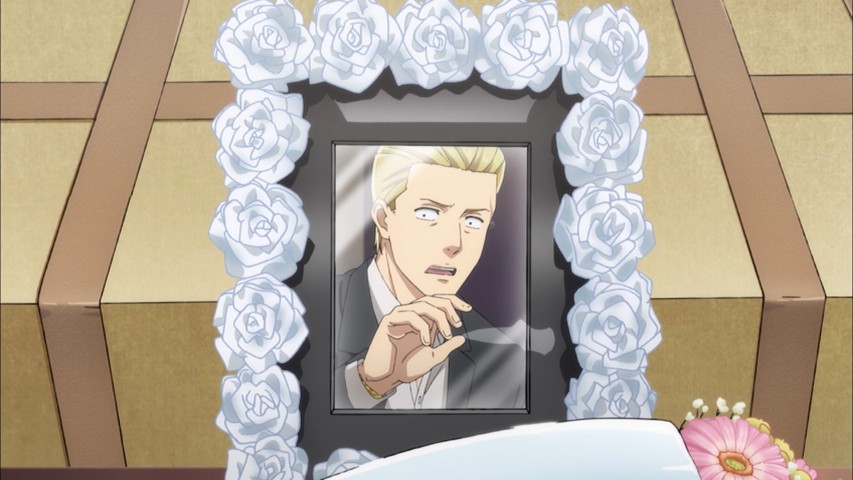

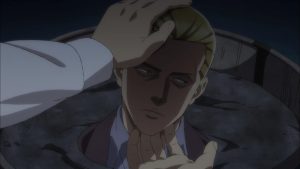
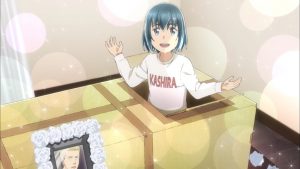
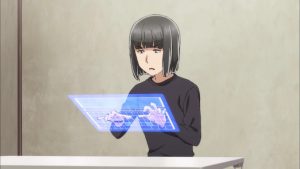
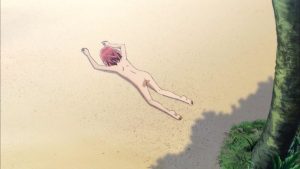
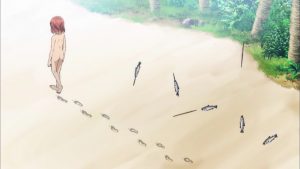

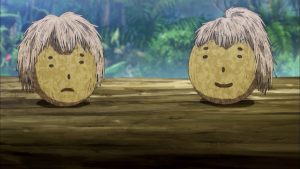

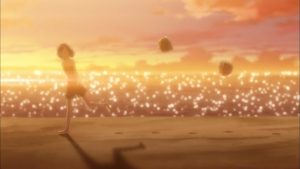
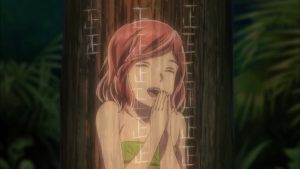
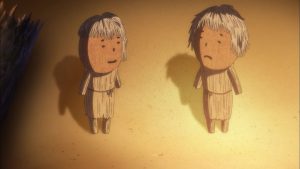
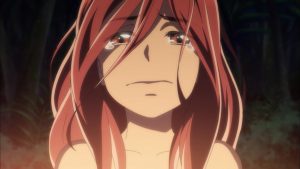

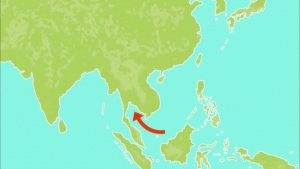
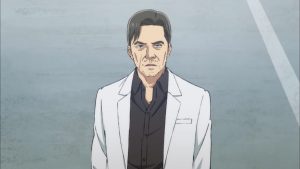
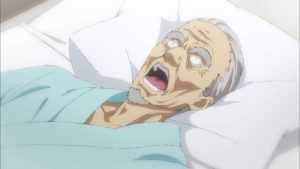
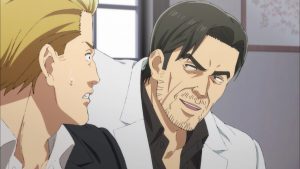
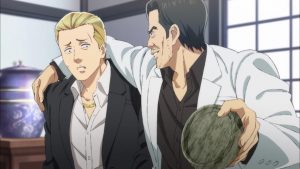
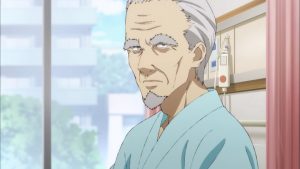
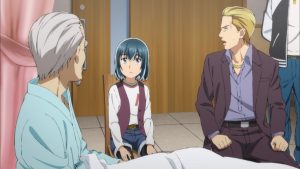
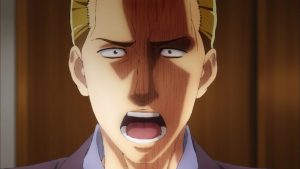
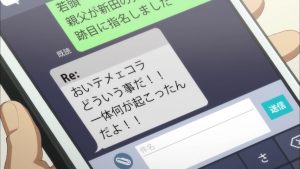
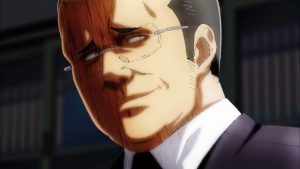
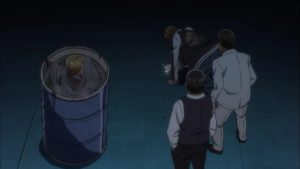
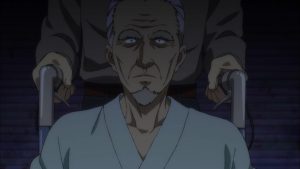
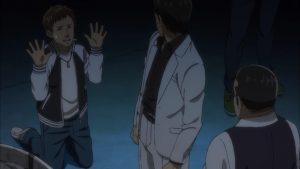
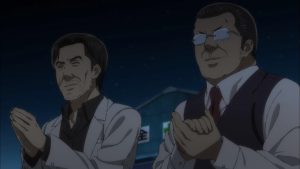
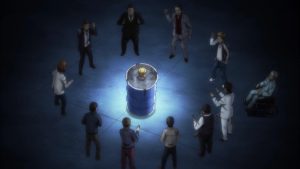
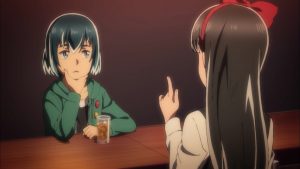
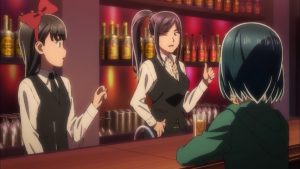
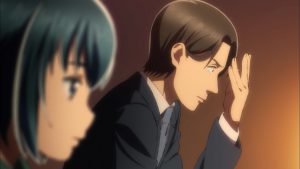
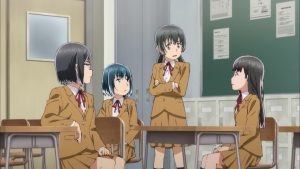

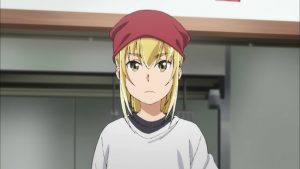

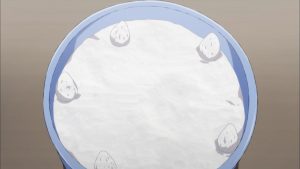
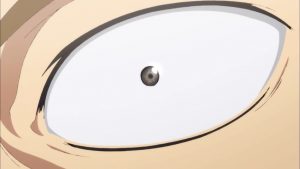
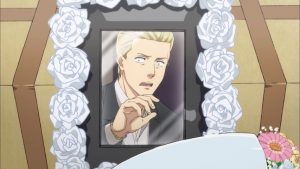
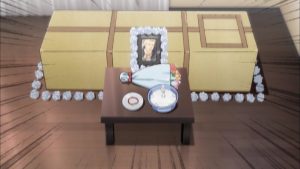
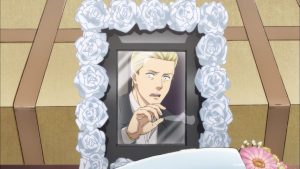
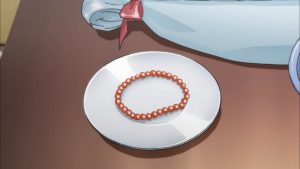
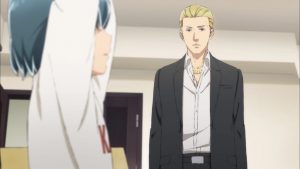
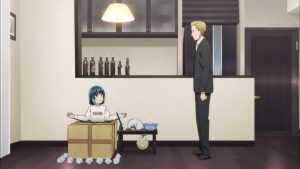



Alonom
June 2, 2018 at 3:21 amActually since you mentioned it, I personally will be very interested in a post explaining and expanding on your opinion about the current commercial model.
Great review as always!
Guardian Enzo
June 2, 2018 at 3:30 amOhhh, boy… You do not want to open that can of worms. Or who knows, maybe you do.
I might do that someday, but I dunno – Hinamatsuri has cute girls, some action, really good visuals… But it challenges the audience a little and that’s generally a death knell with the audience that might buy the discs because of the cute girls. Something like Made in Abyss or even Golden Kamuy can (projected, in the latter case) do decently on disc because it’s mostly chasing a different (smaller) audience to begin with. It sucks that a really good show like this can only be a one-cour commercial for the manga and not succeed commercially on its own terms as an anime.
Simone
June 2, 2018 at 4:00 amWhat’s the popularity of the Hinamatsuri manga, and what happened to that? Frankly, you would expect something like Golden Kamuy to incur in exactly the same issues, they don’t seem to start from very different points, and Hinamatsuri anime-wise was better produced. Do the whims of stuff like airing time play a role?
Guardian Enzo
June 2, 2018 at 4:27 amHinamatsuri is considerably less popular than Golden Kamuy in manga form, though it has sneaked into the ranking a couple of times (including after the anime announcement). To me, I think a bigger deal is that Golden Kamuy and Made in Abyss are going after a different audience – it all goes back to the “house of pies” model I’ve talked about a few times. The slice of pie they’re going after is much smaller to begin with, but if you can impress it with edginess or great writing, you can pull decent (like 4-5 K) numbers.
Hinamatsuri, by contrast, isn’t edgy or avante garde enough to go after that slice – and superficially it looks a lot like the anime which go after the biggest slice. But that slice instantly rejects you if you even remotely try to challenge it the way Hinamatsuri has, so the result is sales disaster.
Simone
June 2, 2018 at 5:07 amMaybe it’s just a disconnect between who watches and who buys? With the ridiculous prices that anime BDs reach in Japan, I can imagine that only some really dedicated people (read: hardcore otakus) will actually pour money into them, the rest might be content to watch the show on TV, and even appreciate it, but that’d be it.
Guardian Enzo
June 2, 2018 at 5:15 amThat disconnect certainly does exist – partly because the average 2-episode BD is over a hundred bucks – and that’s a big reason why the system is killing anime creatively. But shows like MiA and GK can still pull an inside straight and get just enough buyers to turn a small profit as anime.
David
June 2, 2018 at 9:21 amYeah, Mao’s presence is more significant in the second half of the series (the “three years later”, indicated from the first episode). If the studio knew going in that they weren’t going to make a second season, they probably could have skipped her intro bits, but it wouldn’t be enough to trim the entire run down to one season, so it’s nice that she gets her little moments. Instead they cut most of the yakuza stuff, since almost none of it directly impacts the main plots around the girls. That side is more focused on Nitta, which isn’t really needed, given he interacts with Hina enough as it is.
What was really striking with Mao is her use of her powers, which comes out much more strongly than in the manga (for obvious reasons). There’s a sense of strength and control that comes out as more intense than Hina or Anzu, who have both adapted to using their powers as little as possible. Anzu hasn’t used her powers for anything since the jan-ken-pon contest. Hina uses her powers for minor extra convenience, but despite her being the strongest of the three, and supposedly known for throwing her powers around at the slightest pretense, feels more like an ordinary girl who happens to have minor TK powers.
With Mao, however, it seems like she uses her physical body for almost nothing, and relies on her powers for the vast majority of what she does. And that quick sharpness of how she uses it honestly feels a bit more creepy than the raw power that Hina manifests. You complain about Mao walking around naked as being nothing more than fanbait, but to me it feels more like a deliberate choice to illustrate a part of her personality. Hina and Anzu both demanded/acquired clothes pretty much as soon as they were let out of their pods. Mao didn’t bother trying to make clothes for herself until she’d been on the island for 12 days.
I didn’t get this feel from the manga when originally reading Mao’s intro, but in animated form, she definitely felt more like the “innocent psychopath”. Though ‘psychopath’ is probably not really the right word. She seems cute and innocent, and can stand in contrast to Hina and Anzu regardless of whether that innocence in real. The simple island introduction can work either as-is, or as the backdrop on a much darker view of the character. It really is very well done.
sonicsenryaku
June 2, 2018 at 10:24 amOne thing i noticed was that Mao was on that island for 198 days and yet that time lapse didn’t seem to be taken into account by the events concerning Nitta and Hina. So ummmmm, are we just to assume that whatever is happening with our main cast is occurring between that interval Mao was stranded on the island? Did she not stay on the island for as long as she thought she did (that would be inconsistent with the visual information given by the growth of her hair) or is there some time dilation thing going on here?
David
June 2, 2018 at 11:02 amWe know that Mao was on the island for 198 days — roughly 6 months. We know she wasn’t summoned until after Ikaruga’s call, which was at a point that I would probably guess as being around 6 months after Hina’s initial arrival. (Certainly Anzu’s time with the homeless, plus a bit of time with her new family, could reasonably fit within that time period.) And we know that the scene at the very start of the series (Mao fighting the martial artists) was 3 years after Hina’s arrival, and thus presumably around 2 years after Mao’s departure from the island.
There’s no reason to think that they’re playing games with time on the island. Even if they considered introducing some sort of time travel shenanigans for when she arrived, there doesn’t really seem to be any point in doing so, given the data points we have so far. (Ikaruga’s call; the fight 3 years in the future; Mao’s changing hair length; Mao’s movement from some island near Malaysia over to the vicinity of Thailand, rather than Japan)
So yeah, there’s no reason to think that there must be a 6 month time gap between the non-Mao story skits. It’s just something happening on the side. It’s reasonable to assume that any of the stuff we see around Mao (until she reunites with Hina) will be occurring in parallel with anything going on with the main cast, from this point forward.
sonicsenryaku
June 2, 2018 at 11:12 am“So yeah, there’s no reason to think that there must be a 6 month time gap between the non-Mao story skits. It’s just something happening on the side.”
Well yea that’s the point I’m trying to make; it means that everything happening to Nitta and co. within this ep and probably the next or so will be taking place between the 6 months Mao was on the island as well as after she left. Otherwise, we should have seen Hina moving on into the 8th grade and some shift in the status quo of the series by this point
Sam
June 2, 2018 at 10:15 amWasn’t Kyōkai no Rinne dismal on sales but still got like 6-7 renewals? 🙂
Not complaining at all as I was a big fan of that anime and watched every single episode – and just going to pretend just having the famous Mangaka behind isn’t good enough to keep pumping out money losing episode (albeit very low budget one). lol
Also not sure it’s just me but I can’t take seriously on the notion of yakuza portrayed as losers for giggles is somehow bad for society. Don’t think there is any sinister motive behind here, trying to rehabilitate criminals’ image with backing with yakuza dough or something. If it is funny, that should be sole barometer for comedy like this and I don’t go much deeper than that, especially when it is for light comedic effects. One could go to towns with how media/video game glorifies violence and sex, but obviously I am not in camp for blaming that for much of societal woes.
Unfortunately they clammed a bunch into like 5-6 min short here and the mafia segment in this week wasn’t that funny and felt disjointed (like Sabu getting off easily only after throwing up a couple times, as you rightly pointed out). They probably won’t touch much, if any, yakuza storyline given how they mostly just skipped those storylines so far while covering manga chapters, but it’s a bit of shame as they are quite funny and an integral part…with Nitta being one.
David
June 2, 2018 at 11:26 amYeah, I don’t really understand Enzo’s comments on the yakuza (“yakuza with a heart of gold”, “hapless doofs”), as, even without the manga chapters focusing on the yakuza, I just can’t see whatever he’s imagining. The only thing the studio has done is make that initial scene with Hina clearing out the rival yakuza gang a bit more comical, to take the edge off, and that was for Hina’s sake, not the yakuza’s.
Aside from that: Naito has spent time in jail. Nitta was ordered to kill the boss of a rival gang, and he himself was nearly killed in this episode. Nitta believably convinced his own family that Hina was the survivor of a mob feud, with her mom shot in the middle of dinner, and her dad killed after killing two other yakuza in retaliation. The lawyer that wrote Hina’s student council speech assumed he was called in to deal with some gang members that had been arrested. The overweight mid-boss complains about being banned from most other restaurants and bars because he’s part of the yakuza. Nitta got his scar from such a trivial event as failing to light a cigarette quickly enough (which in turn sheds a bit of light on Sabu’s paranoia and feeling sick about making a mistake about the succession, as it implies what he’s afraid might happen to him over what seems like a fairly innocent mistake).
The only thing that I could see as overly biasing Enzo’s perspective is the simple fact that the yakuza still act like regular people, rather than be solely portrayed as Evil Stupid. Nitta has interests and hobbies. They occasionally go out to lunch. The boss is old enough to want to spoil a granddaughter. They gather and talk together at a bar (and largely the same bar, because it’s one of the few that won’t kick them out).
They’re still fairly normal people, despite what they do, and that very contrast is part of the comedic element.
Yann
June 2, 2018 at 6:46 pmIt’s such a good anime… One of the very few which actually brought tears to my eyes (and almost simultaneously made me laugh…). But I wouldn’t buy it. It doesn’t feel like the kind of anime I would want to watch again in the future.
Who even buys hard copies of anything nowadays with all the streaming services? It is different in Japan?
Maybe that’s part of it…?
Guardian Enzo
June 2, 2018 at 8:08 pmIndeed that is a part of it. Only serious and hardcore otaku buy anime on discs for the most part – that’s why it’s really tough for anime that don’t target those groups to break even unless they have other income sources. Such as popular WSJ titles and huge selling manga – they don’t have to sell a ton of discs to make the anime worthwhile financially – it’s all about growing the franchise.